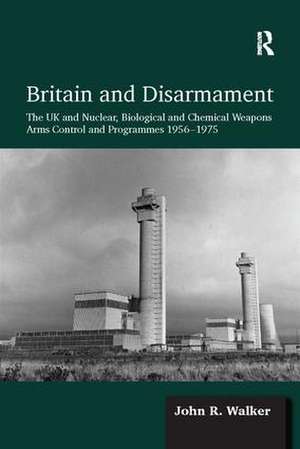Britain and Disarmament: The UK and Nuclear, Biological and Chemical Weapons Arms Control and Programmes 1956-1975
Autor John R. Walkeren Limba Engleză Paperback – 24 mai 2017
| Toate formatele și edițiile | Preț | Express |
|---|---|---|
| Paperback (1) | 299.52 lei 6-8 săpt. | |
| Taylor & Francis – 24 mai 2017 | 299.52 lei 6-8 săpt. | |
| Hardback (1) | 825.43 lei 6-8 săpt. | |
| Taylor & Francis – 28 ian 2012 | 825.43 lei 6-8 săpt. |
Preț: 299.52 lei
Preț vechi: 356.64 lei
-16% Nou
Puncte Express: 449
Preț estimativ în valută:
57.31€ • 59.84$ • 47.33£
57.31€ • 59.84$ • 47.33£
Carte tipărită la comandă
Livrare economică 15-29 aprilie
Preluare comenzi: 021 569.72.76
Specificații
ISBN-13: 9781138110960
ISBN-10: 1138110965
Pagini: 322
Dimensiuni: 156 x 234 mm
Greutate: 0.45 kg
Ediția:1
Editura: Taylor & Francis
Colecția Routledge
Locul publicării:Oxford, United Kingdom
ISBN-10: 1138110965
Pagini: 322
Dimensiuni: 156 x 234 mm
Greutate: 0.45 kg
Ediția:1
Editura: Taylor & Francis
Colecția Routledge
Locul publicării:Oxford, United Kingdom
Notă biografică
Dr John R. Walker works in the Arms Control and Disarmament Research Unit, Foreign and Commonwealth Office, UK.
Recenzii
’A meticulous, broad-ranging study of nearly 20 years of British arms control history, the book is highly recommended for anyone seeking to better understand how policies governing some of the worst kinds of weapons have developed in the United Kingdom - and where Britain has come from as it contributes to the arms control debates of the present.’ VERTIC ’What is unquestionable is that Dr. Walker has done a remarkable task of providing a detailed account of a set of complex negotiations on major - one might say, ’life or death,’ issues.’ British Politics Group Newsletter 'Walker ... is in an ideal position to analyse the relevance of past policy to current and future challenges in these fields. He is also able to traverse the academic and policy worlds and, having worked with him first-hand on the AHRC-funded project at Southampton University on which this book draws, I can testify he does so with honesty and integrity of the highest order.' British Journal for the History of Science
Cuprins
Chapter 1 Introduction Britain and Disarmament: Weapons Programmes and Arms Control: Balancing Conflicting Requirements; Chapter 2 The UK’s Offensive CW Programmes: Abandonment and Aspirations 1956–1969; Chapter 3 1 ‘Inappropriately hilarious’ was a phrase used to describe the condition of some UK soldiers after a field trial of an incapacitating agent when they were under observation in a hospital. See TNA WO 195/16694, Applied Biology Committee: SMALL CHANGE (field trials with and incapacitant), 1968; Chapter 4 A Tale of Two Riot Control Agents: UK Attitudes to CS and the 1925 Geneva Protocol and CR in Warfare and Law Enforcement 1969–1975; Chapter 5 The Biological and Toxin Weapons Convention: Origins of the UK Proposal to Separate BW from CW 1968; Chapter 6 The UK and the Biological and Toxin Weapons Convention Negotiating History: March–September 1971: The Key Months; Chapter 7 The UK and Why ‘Research’ Was Dropped from the Draft Biological and Toxin Weapons Convention; Chapter 8 The UK Nuclear Weapons Programme, Fissile Material Cut-off and Safeguards 1956–1973; Chapter 9 UK Nuclear Weapons, the Atlantic Nuclear Force (ANF) and the NPT 1962–1968; Chapter 10 UK Nuclear Weapons and the Strategic Arms Limitations Talks 1969–1973; Chapter 11; Conclusions: Britain and Nuclear, Chemical and Biological Arms Control and Disarmament; annex 1 Main Operative Articles only included here;
Descriere
Through a thorough exploration of British government records, this book explores the UK's nuclear, biological and chemical weapons programmes and attempts to control them between 1956 and 1975. It addresses issues concerning the military, economic and political pressures that influenced policy; the degree to which the UK was a reluctant or enthusiastic player on the international arms control stage; and the effect of international agreements on Britain's weapons programmes. In so doing, it provides the first attempt to assess Britain's NBC arms control policy and practice during the Cold War.


